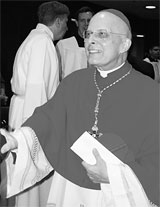 |
 |
|||||
 |
 |
 |
 |
 |
|||
 Cardinal George greets participants at a memorial Mass for Cardinal Johannes Willebrands Sept. 17 at Holy Name Cathedral. The Mass, celebrated by Bishop Basil Meeking, was one of the cardinal’s first public appearances since his cancer operation July 27. Catholic New World/ Sandy Bertog |
Cardinal George reflects on health, life and eternity
By Michelle Martin Staff writer Nearly two months after having his cancerous bladder removed, Cardinal George spent several hours Sept. 25 and 26 meeting with members of the media in advance of resuming his public schedule Oct. 1. The cardinal said he is doing well and no longer experiencing pain from the July 27 surgery, which included the removal of his bladder and using a section of bowel to create a new bladder. Doctors did a second operation late that night after discovering that a blood vessel was still bleeding internally. Cardinal George, 69, acknowledged that for a period of several hours following the first surgery, he believed he was dying—a thought which did not frighten him. “The important thing when you die is to be ready to surrender your whole life to the Lord,” he said. “When you’ve done that, when you’ve given the Lord your life, that brings a certain peace. After that, it’s up to the Lord to take care of you, and he will. That’s his end of the bargain.” And, while being in pain makes it difficult to think, Cardinal George said he could feel the prayers thousands of people were saying for him. “I knew I wasn’t alone,” he said. “I could sense that I was in people’s prayers. I could also sense the presence of the Lord. The Lord was with me, and he brought his friends—and quite a few of my friends, too.” Since leaving Loyola University Medical Center for his North State Parkway residence in August, the demands of convalescence and physical therapy have not left as much time for thought and reflection as he expected, Cardinal George said. But there has been some, and among the things he is thinking about is creating some new priorities for the archdiocese. Since being named archbishop in 1997, Cardinal George has used the “Decisions” document created under Cardinal Joseph Bernardin to set the direction for the archdiocese. While many of those priorities remain—some, like evangelization, will always continue—it’s time to take stock again, the Cardinal said. “I think we need to focus on a spiritual renewal of the archdiocese,” he said. “We’ve seen a lot of growth in perpetual adoration and the liturgical life of the archdiocese has been renewed by the Liturgical Institute (at Mundelein Seminary/St. Mary of the Lake University), we see it in traditional devotions that people are looking for now.” The move comes after the church secularized itself in the 1960s and 1970s, he said. It has now entered a “post-secular” period in which many young people are seeking more than material goods. “There might not be many, but there are enough of them that want priests to be priests,” he said. “That means being a mediator and speaking with authority about life with God.” Priests, he said, should “talk more about the Lord than about the parish. It’s a direction I want to test and talk to the priests about.” At the same time, one of the things that has surprised Cardinal George over the past two months—besides the intensity of the pain following his surgery—was how well the archdiocesan administration ran without him. Seeing that has given him the confidence to say he will delegate more of the day-to-day duties in the future. “I am content to allow others to do more,” he said, “I’m always in such a rush to do administrative work I sometimes don’t pay enough attention to the details.” Cardinal George said he was never angry at God about his illness. “I didn’t have time to be angry before the operation,” he said. “And of course, after the operation, you’re focused on getting well. … God has sustained my vocation, accompanied me through life and loved me. If I were to die tomorrow, I’d have no reason to be angry with the Lord. Quite the opposite.” While he would be sorry to leave the people he loves on earth, at least for a time, and give up his “projects and plans,” Cardinal George said, the goal of this life is to share eternal life with God. “The important thing is that you live with the Lord in eternity.” |
||
|
|
|||